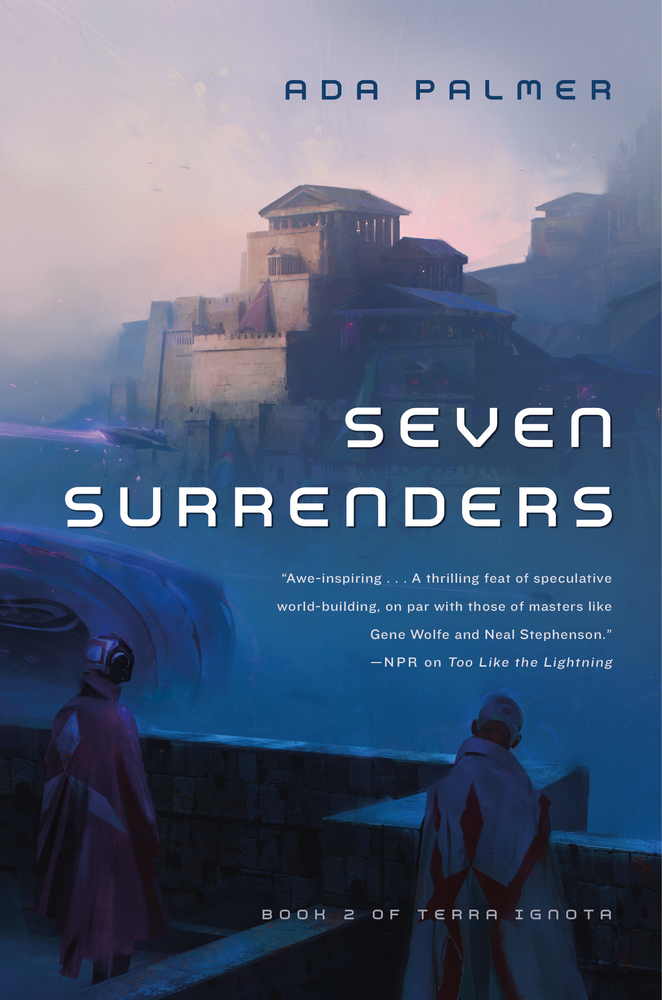Daniel Darabos reviewed Seven Surrenders by Ada Palmer (Terra Ignota -- book II)
Review of 'Seven Surrenders' on 'Goodreads'
5 stars
[book:Too Like the Lightning|26114545] was brilliant, and Seven Surrenders continues on the same track. Still the two defining features for me are 1) there is a hundred times more plot here than in other books and 2) with all that plot there is still room for a narrator whose presence is continuously felt.
The plot is massive and involves a myriad characters, set in a strange world where factions and people stand for various philosophies and theologies. It is very stimulating reading, enjoyable as a giant puzzle and as a source of ideas to ponder long after closing the book.
Compared to the first book, we start off knowing more (of course) and the stakes are higher. We get more answers than questions this time, but digesting it all is still a challenge. As a character is praised in the book for never using the same trick twice, Ada Palmer avoided doing that in the first book. Here, though, a couple times we are present at a scene where a secret the reader already knows is exposed to characters. It is done graciously, of course, and each time we learn more about the characters and the secrets in the process. These are the only speed bumps where the plot does not move at its normal break-neck speed. Normally every page contains an unexpected revelation or twist.
How with the giant and rushing plot then does Ada Palmer find the time for such thoughtful narration?
You may, if you wish to aid us, pray as well, reader. The Hand that weaves Providence knows everything from creation to infinity, and takes account of the future when He plans the past; if prayer has any power to sway Fate, then even though, from your perspective, Carlyle was either saved or not saved long ago, it could still be your prayer, now, as you read, that swayed the Judge.
Beneath that grotesque shell he might be any kind of man, [...]. It hurts not knowing, but you feel this all the time, do you not, reader? Frustration’s itch as you boil with questions which I and my peers, distant or dead, cannot be made to answer.
A hush; as centuries are too rough a measure for the passing of an age, so seconds cannot track the tides of emotion which flowed across Caesar’s face, eroding away his masks of stone and iron and baring something human.
I had to interrupt reading another sci-fi book to read Seven Surrenders when it was released, so I have a baseline to compare against. All of that book feels like filler compared to the Terra Ignota books. Things happen, but the plot does not really move forward. If we still live in the same world after a scene, Ada Palmer would omit that scene.
This makes room for so many thoughts! I am so ill-educated about classical philosophers, that I cannot know to attribute the genius of a paragraph to them or to the author. They are all in this together for sure.
Classical philosophy as I have met it before often seemed too abstract. Today you can just go to work, buy food, eat it. Nothing prevents you from doing the same tomorrow, and nature ensures you do not need to think about infinity. So what does philosophy matter? These books answer that by driving toward a future where we do need to decide what we want for ourselves.
The dizzying moment in the first book is when Mycroft's crimes are revealed. We find it hard to even believe it, much less understand why he committed them. It feels like there can be no answer. And of course we get an answer in book two!
As emotionally striking the revelation of their crimes was, knowing the explanation is possibly even worse. If you accept the explanation, you are in a way also guilty of those crimes.
Yet the explanation is incomplete. We still do not know what happened to the Canner bash' or why the Mardis were exactly set in motion. Mycroft considers two people Gods, but still has more respect for Apollo Mojave and more affection for Saladin, two people we know barely anything about. With so many questions answered, does it matter whether some still remain? Maybe not. But after these two books I have learned to see conspiracy everywhere.
It will be a long wait until the next two books!

